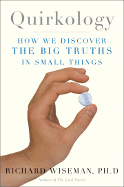
 In this Age of Anxiety, it's not hard to understand the popularity of works on human behavior like The Tipping Point, Blink and Freakonomics and a host of others trailing in their wake. Perhaps we hope they'll help us to a better understanding of ourselves and our fellow inhabitants of the planet and in the process relieve us of some of our own neuroses. Or maybe they're hot because they're simply entertaining works of pop psychology and sociology.
In this Age of Anxiety, it's not hard to understand the popularity of works on human behavior like The Tipping Point, Blink and Freakonomics and a host of others trailing in their wake. Perhaps we hope they'll help us to a better understanding of ourselves and our fellow inhabitants of the planet and in the process relieve us of some of our own neuroses. Or maybe they're hot because they're simply entertaining works of pop psychology and sociology.A noteworthy addition to this growing list of titles is Richard Wiseman's Quirkology: How We Discover the Big Truths in Small Things. Wiseman has written a captivating book about what he's termed "quirkology": sometimes offbeat research into the more remote corners of the forest of human behavior, encompassing subjects like astrology, the paranormal, luck and the psychology of decision making.
The author, who's also a practicing magician, is a breezy and companionable guide through this world of quirky research often performed by highly regarded scientists at major universities. Wiseman introduces broad themes, like our beliefs about the ways in which the date or time of our birth influence behavior or how common superstitions shape our lives, and then summarizes numerous research studies focusing on these phenomena. As a good scientist, he's careful to raise questions about those studies that may have lacked an adequate foundation and is aware of the danger of confusing correlation and causation.
But Quirkology isn't a tedious catalogue of sometimes arcane psychological investigation. It's loaded with the results of practical studies that anyone might apply in daily life. For instance, a liar's dead giveaway isn't sweaty palms or shifty eyes, it's the number of words she employs to answer a question (liars use fewer) or the number of times he says "I" (truth tellers use that word more). In another study, Wiseman concluded that a balance of 70% "this is me" versus 30% "this is what I'm looking for" words in personal ads is most likely to generate a positive reply. If only Psychology 101 had been this useful and this much fun.
The only chapter that isn't completely engaging is the one that recounts Wiseman's extensive search for the "world's funniest joke." Inspired by the brilliant Monty Python sketch about a joke so hilarious that anyone who reads it instantly dies of laughter, Wiseman and his colleagues set out to find its less deadly counterpart; even Wiseman concedes he likely succeeded only in discovering "the world's blandest joke."
The book provides endless fodder for lively conversation. In an afterword, Wiseman even offers a helpful list of 10 factoids based on research reported in the book he claims will "pep up the dullest of dinner parties." (Example: "Women van drivers are more likely than others to take more than ten items through the express lane in supermarkets, to break speed limits, and to park in restricted areas.")
Even the most rational among us have difficulty getting through a day without succumbing to occasional bouts of superstitious, wishful or even magical thinking. If we didn't realize it already, Wiseman's book reminds us we've got plenty of company in that often inexplicable behavior. And if that knowledge doesn't offer at least some small comfort, we can always reach for a rabbit's foot or read our horoscope.--Harvey Freedenberg

